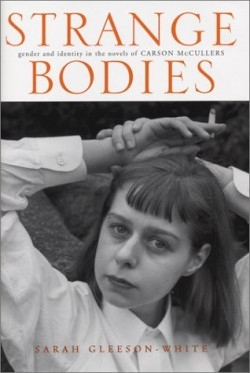
Strange Bodies
Gender and Identity in the Novels of Carson McCullers
In both her life and her narrow but vivid body of work, Carson McCullers claimed a secure (albeit marginal) perch in American literature’s Southern renaissance Gothic wing. More so than with her kinswomen Flannery O’Connor and Eudora Welty, her melancholy tomboys, deviants, dwarfs, virgins, and outcasts from insular Southern society were often stylistically constrained by forties-era euphemisms of sexual role-playing. Though McCullers would defend her novels as realistic, aligning them with the great Russian tradition (Dostoevsky, Gogol, Chekhov) of irreverently mixing pathos, base desire, and high comedy together, the “grotesque” moniker stuck: she was an amber-encased case study of spiritual isolation.
The winds of revolution, however, have shaken criticism’s scholarly foundations. As feminism supplanted Freud, so now gender studies (how McCullers, a great reader of Freud, would have adored this rubric) offer fresh dialogues with the past. The author, a professor at the University of New South Wales, Australia, has used the four core novels—The Heart is a Lonely Hunter, The Ballad of the Sad Café, The Member of the Wedding, and Reflections in a Golden Eye—for a stimulating interpretation of their restive anxiety at the formation of identity. Like the wistful tomboys Mick and Frankie, characters navigate uncharted terrain, not merely of the “love that has no name,” but of the larger, human love, the “unfinished metamorphosis” that is the changing body itself (the term is Russian critic Mikhail Bakhtin’s, from his 1984 seminal book on Rabelais). Gender itself is “nomadic,” fixed selfhood is deferred to the tension of becoming a self, that “arduous process.”
Bakhtin’s Rabelais and His World has cut a wide swath through American critical discourse, and Strange Bodies is heavily endebted to its privileging metaphors of the degenerate body and the corporal masquerade of the grotesque. Rabelais’s famous image was of the god Silenus, a hermaphrodite whose statue, if opened, contained beautiful wisdom, but Bakhtin’s conclusion, that the sixteenth-century Frenchman greeted death and life in one great “gay and bright” smile, does not augur well for McCullers’s vision. Gleeson-White abruptly swerves toward the opposite pole: Rabelais’s grotesques liberate the world, whereas McCullers’s are still haunted by their own bodies’ strange mysteries, still engaged in the centrifugal “painful substance of life.”
Put another way, contra Freud’s dictum that anatomy is destiny, perhaps it is melancholy that is our most human destiny.
Reviewed by
Leeta Taylor
Disclosure: This article is not an endorsement, but a review. The publisher of this book provided free copies of the book to have their book reviewed by a professional reviewer. No fee was paid by the publisher for this review. Foreword Reviews only recommends books that we love. Foreword Magazine, Inc. is disclosing this in accordance with the Federal Trade Commission’s 16 CFR, Part 255.
